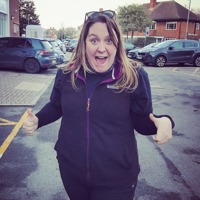
Annie Winson
Hazard and Vulnerability Specialist at British Geological Survey
Find the thing that you are passionate about and don’t let anybody tell you that you’re not going to succeed. Get your head down, work hard and let all of the noise fade into the background.
About Annie ...
Who am I?
"For my personality types I got: Communicator, Innovator and Investigator. Some of the qualities described here I would have expected but others, not so much. Some of the main qualities for being a communicator such as knowing how to speak to different audiences and simplify complex information are skills that I learnt throughout my PhD and whilst working at Universities as a lecturer. I love what I do, so of course I love talking about what I do with other people. This means that I am very happy working in teams of people, and I try very hard to listen to what they have to say so that we can collect lots of ideas and come up with new solutions. Most of my day to day work is focused on problem solving and sometimes this means that you have to be creative in making connections between information or think about things in a way that perhaps other people haven't considered. I think that these qualities come through strongly in the Innovator and Investigator categories.My brain is slightly different from many other people's because I am dyslexic and dyscalculic. Sometimes this can be a secret superpower because I can see ways to fit information together that other people might be able to see but sometimes, and certainly whilst I was at school, this could be very frustrating. It has meant in the past that I haven't been very confident in my abilities (especially with numbers and language) and so this is something that I have had to work on. If you are someone whose brain is a little bit different, then it can be confusing to have to try and force yourself to learn in the same way as other people. I was lucky because I had teachers and parents who could help me to find ways of learning that worked for me and this has helped me to develop the career that I wanted. In fact I think that these experiences have helped me to be a better communicator because I am used to finding different ways to explain things."
What do I do?
"I have been at the BGS for a year now and I am really enjoying the projects that I get to work on. In the past I have always working on research problems to do with volcanoes, but now am working on all sorts of different geohazards (earthquakes, volcanoes, landslides and floods) and how they affect each other and the people who live in these areas. At the moment much of my work involves working with scientists in other countries and learning from them. The aim of my work is to help communities to be better informed and prepared for the hazards that could affect them.I love working on complex problems and trying to pick apart all of the strands of information that make up the question I'm trying to answer. I also enjoy travelling and working with people from other parts of the world. There is so much that can be learnt from other peoples experiences. Finally I like that the work we do contributes to a great understanding of community risk. "
How did I get here?
"I knew that I wanted to be a volcanologist from a very young age, ever since I found out what one was when I was 9. I was lucky to have very inspiring Geography and Geology teachers whilst I was at school who gave me great advice. I did my undergrad in London and then went onto a master's degree in Bristol. I took time between each of these degrees to work in different industries (oil and gas and civil engineering) but I kept coming back to volcanoes. In the end I moved to Singapore to take up a PhD position at the Earth Observatory of Singapore. I was lucky enough during this time to work with some brilliant scientists from the Philippines and Indonesia and other observatory staff from all around the world. My research was focused on forecasting volcanic eruptions and communicating volcanic hazards. After 6 years I came back to the UK and started a lecturing post in Aberystwyth, where I particularly enjoyed working with students on their dissertation projects. I moved into another lecturing job at Kingston so that I could be a little closer to family. I really loved teaching, but I found that I had very little time for research. When the job at the BGS was advertised it seemed like a god time for a change and I certainly haven't regretted the decision.My career trajectory has not always been smooth, but I have always tried to make the most of the opportunities I have been offered. That's worked well so far!"
The life I live
"Music has always been a big part of my life. I'm lucky that i've had lots of opportunities to perform all over the place, and it's nice to have a way to supplement your income when you're a student! I also love to cook, read and travel. I have lived in different places in the world so I now have friends who live in lots of interesting places. I am often planning trips to see them and explore new places."
My typical day
"A lot of the work I do at the moment is based at the computer. My day always starts with answering emails and dealing with anything that might have come up since the day before. Then I may spend time reviewing data and papers (there's always a huge stack of those on my desk) to help me understand how to build models we need for my projects. I meet with other members of teams who might be working on the same projects as me and discuss what we need to do to move forward. We also have a lot of Skype meetings because our partners are all over the world. Occasionally I will travel overseas to: attend meetings, be involved with training sessions or contribute to conferences. This year this has included meetings in Tanzania, Nepal and the US. If I have one of these big trips coming up then I will spend quite a lot of time preparing presentations and talks to help explain our progress."
My qualifications
"AS / A-Levels: Geology, Geography, Chemistry and Biology (AS Level)Undergraduate: 'MSci Geoscience with a Year of International Study'. Royal Holloway College, University of London and University of California, Santa BarbaraCenter for the study of active volcanism, University of Hawaii, HiloMasters: 'MSc Natural Hazards'. University of Bristol.Phd: Volcanology, Earth Observatory of Singapore, Nanyang Technological University, Singapore"



